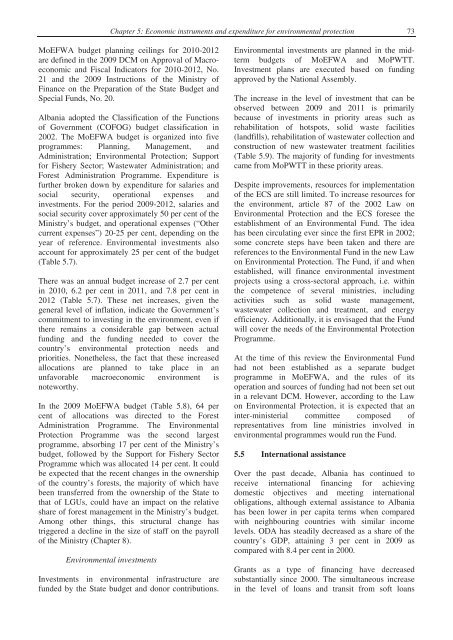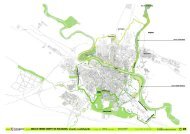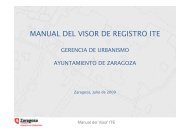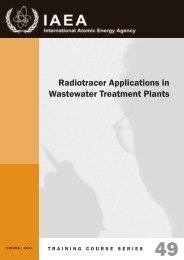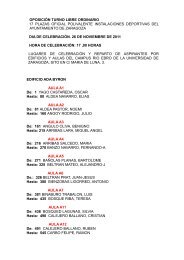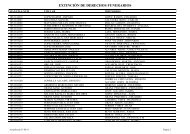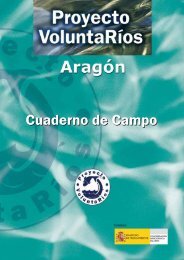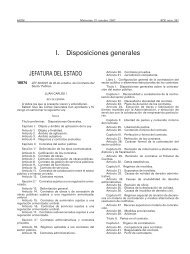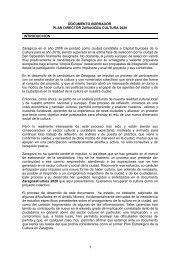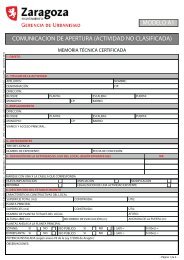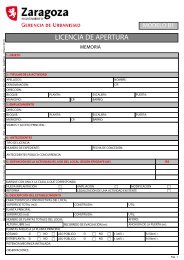Chapter 5: Economic instruments and expenditure for environmental protection73MoEFWA budget planning ceilings for 2010-2012are defined in the 2009 DCM on Approval <strong>of</strong> Macroeconomicand Fiscal Indicators for 2010-2012, No.21 and the 2009 Instructions <strong>of</strong> the Ministry <strong>of</strong>Finance on the Preparation <strong>of</strong> the State Budget andSpecial Funds, No. 20.<strong>Albania</strong> adopted the Classification <strong>of</strong> the Functions<strong>of</strong> Government (COFOG) budget classification in2002. The MoEFWA budget is organized into fiveprogrammes: Planning, Management, andAdministration; <strong>Environmental</strong> Protection; Supportfor Fishery Sector; Wastewater Administration; andForest Administration Programme. Expenditure isfurther broken down by expenditure for salaries andsocial security, operational expenses andinvestments. For the period 2009-2012, salaries andsocial security cover approximately 50 per cent <strong>of</strong> theMinistry’s budget, and operational expenses (“Othercurrent expenses”) 20-25 per cent, depending on theyear <strong>of</strong> reference. <strong>Environmental</strong> investments alsoaccount for approximately 25 per cent <strong>of</strong> the budget(Table 5.7).There was an annual budget increase <strong>of</strong> 2.7 per centin 2010, 6.2 per cent in 2011, and 7.8 per cent in2012 (Table 5.7). These net increases, given thegeneral level <strong>of</strong> inflation, indicate the Government’scommitment to investing in the environment, even ifthere remains a considerable gap between actualfunding and the funding needed to cover thecountry’s environmental protection needs andpriorities. Nonetheless, the fact that these increasedallocations are planned to take place in anunfavorable macroeconomic environment isnoteworthy.In the 2009 MoEFWA budget (Table 5.8), 64 percent <strong>of</strong> allocations was directed to the ForestAdministration Programme. The <strong>Environmental</strong>Protection Programme was the second largestprogramme, absorbing 17 per cent <strong>of</strong> the Ministry’sbudget, followed by the Support for Fishery SectorProgramme which was allocated 14 per cent. It couldbe expected that the recent changes in the ownership<strong>of</strong> the country’s forests, the majority <strong>of</strong> which havebeen transferred from the ownership <strong>of</strong> the State tothat <strong>of</strong> LGUs, could have an impact on the relativeshare <strong>of</strong> forest management in the Ministry’s budget.Among other things, this structural change hastriggered a decline in the size <strong>of</strong> staff on the payroll<strong>of</strong> the Ministry (Chapter 8).<strong>Environmental</strong> investmentsInvestments in environmental infrastructure arefunded by the State budget and donor contributions.<strong>Environmental</strong> investments are planned in the midtermbudgets <strong>of</strong> MoEFWA and MoPWTT.Investment plans are executed based on fundingapproved by the National Assembly.The increase in the level <strong>of</strong> investment that can beobserved between 2009 and 2011 is primarilybecause <strong>of</strong> investments in priority areas such asrehabilitation <strong>of</strong> hotspots, solid waste facilities(landfills), rehabilitation <strong>of</strong> wastewater collection andconstruction <strong>of</strong> new wastewater treatment facilities(Table 5.9). The majority <strong>of</strong> funding for investmentscame from MoPWTT in these priority areas.Despite improvements, resources for implementation<strong>of</strong> the ECS are still limited. To increase resources forthe environment, article 87 <strong>of</strong> the 2002 Law on<strong>Environmental</strong> Protection and the ECS foresee theestablishment <strong>of</strong> an <strong>Environmental</strong> Fund. The ideahas been circulating ever since the first EPR in 2002;some concrete steps have been taken and there arereferences to the <strong>Environmental</strong> Fund in the new Lawon <strong>Environmental</strong> Protection. The Fund, if and whenestablished, will finance environmental investmentprojects using a cross-sectoral approach, i.e. withinthe competence <strong>of</strong> several ministries, includingactivities such as solid waste management,wastewater collection and treatment, and energyefficiency. Additionally, it is envisaged that the Fundwill cover the needs <strong>of</strong> the <strong>Environmental</strong> ProtectionProgramme.At the time <strong>of</strong> this review the <strong>Environmental</strong> Fundhad not been established as a separate budgetprogramme in MoEFWA, and the rules <strong>of</strong> itsoperation and sources <strong>of</strong> funding had not been set outin a relevant DCM. However, according to the Lawon <strong>Environmental</strong> Protection, it is expected that aninter-ministerial committee composed <strong>of</strong>representatives from line ministries involved inenvironmental programmes would run the Fund.5.5 International assistanceOver the past decade, <strong>Albania</strong> has continued toreceive international financing for achievingdomestic objectives and meeting internationalobligations, although external assistance to <strong>Albania</strong>has been lower in per capita terms when comparedwith neighbouring countries with similar incomelevels. ODA has steadily decreased as a share <strong>of</strong> thecountry’s GDP, attaining 3 per cent in 2009 ascompared with 8.4 per cent in 2000.Grants as a type <strong>of</strong> financing have decreasedsubstantially since 2000. The simultaneous increasein the level <strong>of</strong> loans and transit from s<strong>of</strong>t loans
74 Part II: Economic instruments and financial resources(in concession terms) to commercial term loans, is The environmental sector is very much dependent onclosely related to <strong>Albania</strong>’s moving from a low- international financing and a very high proportion <strong>of</strong>income country to a middle- income country.public environmental expenditure is coming fromexternal sources. Several development partners,Donor aid is integrated into the three-year bilateral donors in particular, are considering scalingexpenditure framework that the Government uses to down or phasing out their assistance in coming years.plan and manage public money. In this context, andin order to make donor aid better coordinated, The economic crisis and debt crisis in the euro zoneMoEFWA prepares an environment operational plan. is likely to further reduce the availability <strong>of</strong> donorThis, together with other policy documents, will aid, thus affecting the implementation <strong>of</strong>serve as a basis for establishing a sector-wide environmental programmes.assistance programme.Table 5.6: 2011 Government budget expenditure by function, thousand lekFunctionTotalSocial protection 108,250,490Other unclassified expenditure 88,290,400Economic issues 48,425,057Education 40,560,832Health 37,057,465General public services 25,804,255Housing and community accommodation 21,414,101Public order and security 21,281,100Defence 13,829,726Entertainment, culture and religious issues 3,663,696<strong>Environmental</strong> protection 457,708Total 409,034,830Source: Ministry <strong>of</strong> Finance, 2012.Table 5.7: Ministry <strong>of</strong> Environment, Forests and Water Administration budget by type <strong>of</strong> expenditure,2009-2012, thousand €2009 2010* 2011* 2012*Expenditure on salaries and social security 6,698 7,081 7,333 8,5531 - Planning, management, administration 398 415 419 4802 - <strong>Environmental</strong> protection 488 561 569 6023 - Support to fishery sector 260 350 358 3664 - Water administration 154 167 171 2035 - Forest administration 5,398 5,589 5,817 6,902Share <strong>of</strong> MoEFWA budget (%) 53.82 54.92 47.18 50.43Other current expenses 2,715 2,561 3,983 4,1781 - Planning, management, administration 187 187 220 2682 - <strong>Environmental</strong> protection 358 309 415 4353 - Support to fishery sector 244 220 285 2974 - Water administration 81 81 98 1025 - Forest administration 1,846 1,764 2,966 3,076Share <strong>of</strong> MoEFWA budget (%) 21.81 19.86 25.62 24.64Internal capital expenses 3,033 3,252 4,228 4,2281 - Planning, management, administration 65 81 89 982 - <strong>Environmental</strong> protection 244 244 268 2683 - Support to fishery sector 894 1,276 976 9765 - Forest administration 1,829 1,650 2,894 2,886Share <strong>of</strong> MoEFWA budget (%) 24.37 25.22 27.20 24.93Annual budget 12,446 12,894 15,544 16,959Source: Ministry <strong>of</strong> Environment, Forests and Water Administration, 2011.Note: * According to Medium Term Budget 2010-2012.
- Page 1 and 2:
UNITED NATIONS ECONOMIC COMMISSION
- Page 6 and 7:
vPrefaceThe second EPR of Albania b
- Page 8 and 9:
viiLIST OF TEAM MEMBERSMr. Antoine
- Page 10 and 11:
ixMinistry of Agriculture, Food and
- Page 12 and 13:
xiCONTENTSForeword ................
- Page 14 and 15:
8.3 Biological diversity ..........
- Page 16 and 17:
xvPageChapter 8Table 8.1:Table 8.2:
- Page 18 and 19:
xviiPageLIST OF PHOTOSIntroductionP
- Page 20 and 21:
xixLIST OF ABBREVIATIONSAICASCICANP
- Page 22 and 23:
xxiSIGNS AND MEASURES .. not availa
- Page 24 and 25:
xxiiiExecutive summaryThe first Env
- Page 26 and 27:
The entire education system is subj
- Page 28 and 29:
was done by international consultan
- Page 30 and 31:
1Introduction I.1 Physical contextA
- Page 32 and 33:
Introduction3The country has deposi
- Page 34 and 35:
Introduction5Photo I.1: Ruins of Sk
- Page 36:
PART I: POLICYMAKING, PLANNING AND
- Page 39 and 40:
10 Part I: Policymaking, planning a
- Page 41 and 42:
12 Part I: Policymaking, planning a
- Page 43 and 44:
14 Part I: Policymaking, planning a
- Page 45 and 46:
16 Part I: Policymaking, planning a
- Page 47 and 48:
18 Part I: Policymaking, planning a
- Page 49 and 50:
20 Part I: Policymaking, planning a
- Page 51 and 52: 22 Part I: Policymaking, planning a
- Page 53 and 54: 24 Part I: Policymaking, planning a
- Page 55 and 56: 26 Part I: Policymaking, planning a
- Page 57 and 58: 28 Part I: Policymaking, planning a
- Page 59 and 60: 30 Part I: Policymaking, planning a
- Page 61 and 62: 32 Part I: Policymaking, planning a
- Page 63 and 64: 34 Part I: Policymaking, planning a
- Page 65 and 66: 36 Part I: Policymaking, planning a
- Page 67 and 68: 38 Part I: Policymaking, planning a
- Page 69 and 70: 40 Part I: Policymaking, planning a
- Page 71 and 72: 42 Part I: Policymaking, planning a
- Page 73 and 74: 44 Part I: Policymaking, planning a
- Page 75 and 76: 46 Part I: Policymaking, planning a
- Page 77 and 78: 48 Part I: Policymaking, planning a
- Page 79 and 80: 50 Part I: Policymaking, planning a
- Page 81 and 82: 52 Part I: Policymaking, planning a
- Page 83 and 84: 54 Part I: Policymaking, planning a
- Page 85 and 86: 56 Part I: Policymaking, planning a
- Page 87 and 88: 58 Part I: Policymaking, planning a
- Page 89 and 90: 60 Part I: Policymaking, planning a
- Page 91 and 92: 62 Part I: Policymaking, planning a
- Page 93 and 94: 64 Part I: Policymaking, planning a
- Page 96 and 97: 67Chapter 5ECONOMIC INSTRUMENTS AND
- Page 98 and 99: Chapter 5: Economic instruments and
- Page 100 and 101: Chapter 5: Economic instruments and
- Page 104 and 105: Chapter 5: Economic instruments and
- Page 106 and 107: Chapter 5: Economic instruments and
- Page 108: PART III: INTEGRATION OF ENVIRONMEN
- Page 111 and 112: 82 Part III: Integration of environ
- Page 113 and 114: 84 Part III: Integration of environ
- Page 115 and 116: 86 Part III: Integration of environ
- Page 117 and 118: 88 Part III: Integration of environ
- Page 119 and 120: 90 Part III: Integration of environ
- Page 121 and 122: 92 Part III: Integration of environ
- Page 124 and 125: 95Chapter 7WASTE MANAGEMENT7.1 Intr
- Page 126 and 127: Chapter 7: Waste management97sold f
- Page 128 and 129: Chapter 7: Waste management99SitesC
- Page 130 and 131: Chapter 7: Waste management101Table
- Page 132 and 133: Chapter 7: Waste management103• C
- Page 134 and 135: Chapter 7: Waste management105sever
- Page 136: Chapter 7: Waste management107(b) E
- Page 139 and 140: 110 Part III: Integration of enviro
- Page 141 and 142: 112 Part III: Integration of enviro
- Page 143 and 144: 114 Part III: Integration of enviro
- Page 145 and 146: 116 Part III: Integration of enviro
- Page 147 and 148: 118 Part III: Integration of enviro
- Page 149 and 150: 120 Part III: Integration of enviro
- Page 151 and 152: 122 Part III: Integration of enviro
- Page 153 and 154:
124 Part III: Integration of enviro
- Page 155 and 156:
126 Part III: Integration of enviro
- Page 157 and 158:
128 Part III: Integration of enviro
- Page 159 and 160:
130 Part III: Integration of enviro
- Page 161 and 162:
132 Part III: Integration of enviro
- Page 164 and 165:
135Chapter 10HUMAN HEALTH AND ENVIR
- Page 166 and 167:
Chapter 10: Human health and enviro
- Page 168 and 169:
Chapter 10: Human health and enviro
- Page 170 and 171:
Chapter 10: Human health and enviro
- Page 172 and 173:
Chapter 10: Human health and enviro
- Page 174 and 175:
Chapter 10: Human health and enviro
- Page 176 and 177:
Chapter 10: Human health and enviro
- Page 178:
Chapter 10: Human health and enviro
- Page 182 and 183:
153Annex IIMPLEMENTATION OF THE REC
- Page 184 and 185:
The new 2011 Law on Environmental P
- Page 186 and 187:
Recommendation 3.2:Albania needs to
- Page 188 and 189:
Recommendation 4.2:The Ministry of
- Page 190 and 191:
for 2004 was prepared within the St
- Page 192 and 193:
163Chapter 6: WATER MANAGEMENTRecom
- Page 194 and 195:
There is no updated water resources
- Page 196 and 197:
international consulting and author
- Page 198 and 199:
it is limited only to the level of
- Page 200 and 201:
taken. In addition, NES2, under MoE
- Page 202 and 203:
173Chapter 12: HUMAN HEALTH AND THE
- Page 204:
Recommendation 12.5:(a) The Ministr
- Page 207 and 208:
178Worldwide agreementsYear1979 (BO
- Page 210 and 211:
181Annex IIISELECTED ECONOMIC AND E
- Page 212 and 213:
183Land resources and soil 2002 200
- Page 214:
Education 2002 2003 2004 2005 2006
- Page 217 and 218:
188Law on Local Tax System, No. 963
- Page 220 and 221:
191SourcesIndividual authors1. Bego
- Page 222 and 223:
19336. Albania, Ministry of Environ
- Page 224 and 225:
19568. National Agency of Natural R
- Page 226 and 227:
197101. International POPs Eliminat
- Page 228 and 229:
199UNDP and Ministry of Environment
- Page 230:
201172. National Agency for Environ


